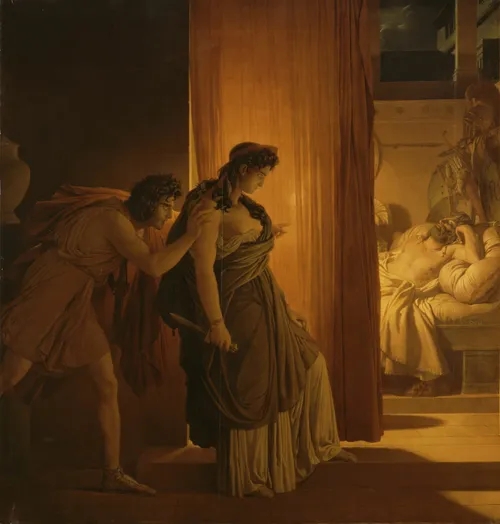
A Greek playwright, Aeschylus, wrote the outstanding Oresteia trilogy. The first of these three plays was titled Agamemnon, and fittingly, was about the Trojan War in which its namesake, Agamemnon, fought as the commander-in-chief of the Greek army.
To the innocent passerby, the Trojan War looked like a clash of arms between the Greeks and the Trojans. But to the Aeschylus, Agamemnon, their fellow Greeks, and the Trojans, it was also a clash of the gods. These gods with names well known, such as Zeus, Apollo, and Artemis, picked sides. Each country, Greece and Troy, had their own unique gods, and each household had private gods! This explains how the Trojan War stood at a climax for ten years straight. The gods were evenly matched and all of considerable power.
The Chorus in the play, a group of people who talk and act as one, consists of elderly men. They lamented their old age, for they could not depart to war with the younger generation, nor gain honor like them. The Greeks loved war and physical combat! Aeschylus centralized this in the play. Greeks were praised for participating in combat and honored.
To the Greeks, deception was wholly acceptable. During the Trojan War, the Trojan horse was delivered to the Trojans by the Greeks. They deceived the Trojans. The horse was no gift of peace, only a gift of defeat.
For the warriors, the Trojan War was a time to fill worldly desires with their captives – unfaithful to the wives they left back home. Everyone is strangely quiet regarding the children of these captives, who became slave girls upon their abduction to Greece. Ethics are absent in the Trojan War.
The most horrific scene in the play is when Agamemnon and his men are about to return home after defeating Troy. Artemis, a goddess who had sided with the Trojans, was vengeful. She arranged the creation of a substantial storm to hinder the safe homecoming of the Greek ships. Agamemnon’s men were alarmed to travel in such weather and knew a god was behind it. Agamemnon heeded his men and prepared to carry out a sacrifice. But not of an animal, of a human: his own daughter, Iphigenia.
There is no explanation offered for how Iphigenia happened to be with them nor why the death of a girl would somehow appease Artemis when, just earlier, the death of a hare and her unborn babies had horrified Artemis so profusely. Yet, it was not the human sacrifice condemned by the writer Aeschylus and others in the play but the abominable, inhumane enthusiasm with which Agamemnon conducted the sacrifice of his own daughter. Aeschylus went so far as to pen that the sacrifice was required, the “harsh yoke of necessity.” The ships, which Iphigenia died so horrifically for, still sank from the storm because of the “profane, unholy, unsanctified” intentions Agamemnon held. Even in their victory, they lost. It was a disaster for both sides.
Upon Agamemnon’s eventual homecoming, his wife, Clytaemnestra, greeted him with adoration, showering praise and bragging of her faithfulness and love, inflating him. The egotistical Agamemnon and sly Clytaemnestra ventured into their palace, followed tearfully by Cassandra, a Trojan Prophetess whom Agamemnon had escorted home as a prize of war, slave, and concubine. Clytaemnestra brought out her wrath upon Agamemnon as the murderer of their daughter, murdering both him and the somewhat innocent Cassandra.
It is tempting to sympathize with the grieving mother, Clytaemnestra. Yet, she murdered her husband, lying through her teeth about her love and faithfulness, for she also had another lover, Aegisthus.
War, death, and vengeance go hand in hand in Greek society. One person killed someone, someone else killed them, and so on, with no end in sight. Everyone seemed to dwell in the wrong, twisting words, stabbing backs, and committing innumerable, jaw-dropping sins.
The Trojan War began because of the abduction of Helen, a married woman who was a little too eager to be kidnapped, from Greece to Troy by the envious Paris. People clashed head to head over other’s sins while committing similar or worse sins themselves, with no thought to the wellbeing of others or right and wrong. Violence leads to violence, and only a turned cheek and forgiveness can stifle it.
Leave a comment